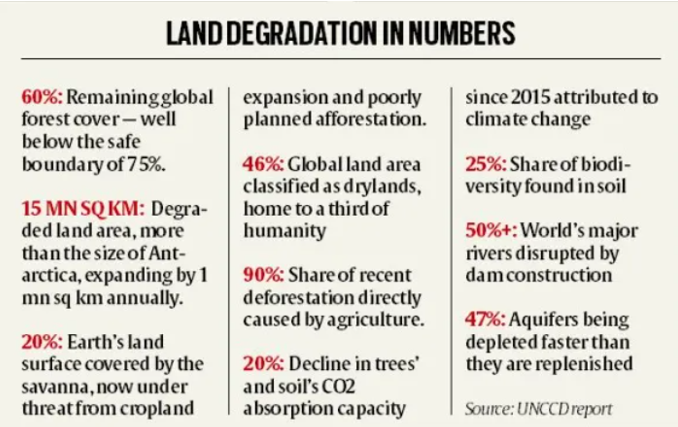UN talks on drought deal in Saudi fail to produce pact
(Source – The Hindu, International Edition – Page No. – 4)
| Topic: GS2 – International Relations, GS3 – Environment |
| Context |
| ● The UNCCD’s COP16 in Saudi Arabia concluded without a binding drought protocol, despite increasing global drought challenges costing $300 billion annually.
● African nations strongly advocated for binding agreements, but developed countries pushed for a less stringent framework. ● Negotiators plan finalization at COP17 in 2026. |
Conclusion of COP16 without a Binding Protocol
- The 12-day UN Convention to Combat Desertification (UNCCD) conference, COP16, hosted in Saudi Arabia, ended without an agreement on a binding protocol to address drought.
- Negotiators required more time to finalize the approach, according to UNCCD Executive Secretary Ibrahim Thiaw.
Significance of a Binding Protocol
- African nations advocated for a binding protocol to ensure governments devise robust drought preparation and response plans.
- Developed countries, however, preferred a “framework,” which many deemed insufficient.
- Indigenous groups supported a protocol to enhance monitoring and planning for drought responses.
Global Context and Challenges
- COP16 followed recent partial or failed environmental negotiations, such as biodiversity talks in Colombia, plastic pollution discussions in South Korea, and climate finance agreements at COP29 in Azerbaijan.
- Droughts, exacerbated by human-induced environmental destruction, cost over $300 billion annually and are projected to impact 75% of the global population by 2050.
Financial Commitments and Future Plans
- During the conference’s first week, pledges of over $12 billion were made by national and regional institutions.
- The Riyadh Global Drought Resilience Partnership aims to mobilize public and private funds for at-risk countries.
- The UNCCD emphasized the need to restore 1.5 billion hectares of land by 2030, requiring $2.6 trillion in global investments.
Next Steps
- Significant progress was made in preparing for a global drought regime, which is expected to be finalized at COP17 in Mongolia in 2026.
- Despite the absence of a protocol, countries can allocate budgets and subsidies to support sustainable land management and farming practices.

| Nations Convention to Combat Desertification (UNCCD) |
| ● Established: 1994, legally binding since 1996
● Objective: Combat desertification and mitigate the effects of drought, particularly in drylands. ● Focus: Sustainable land management, land degradation neutrality ● Scope: Arid, semi-arid and dry sub-humid areas, often home to vulnerable ecosystems and communities. ● Parties: 197, including 196 countries and the European Union. ● Key activities:
● Collaboration: Works closely with other Rio Conventions (CBD and UNFCCC) for integrated solutions. ● Significance: Vital for achieving food security, poverty reduction, and climate change adaptation. |
| Practice Question: What are the key challenges in establishing a binding global drought protocol under the UNCCD, and how can international cooperation address the escalating impacts of drought worldwide? (150 Words /10 marks) |

